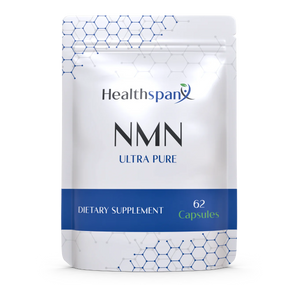NMN And Mental Health: What Does The Science Say?

NMN (nicotinamide mononucleotide) may support mental health by boosting NAD+ levels, improving mitochondrial energy, reducing oxidative stress, and showing antidepressant-like effects in animal studies.
While therapy and lifestyle remain the foundation of mental wellness, new research suggests that NMN—a molecule better known for anti-aging—might also help protect mood, energy, and brain function.
Could this small compound be a big step toward emotional resilience? Let’s find out!
What Is NMN, Exactly?
Nicotinamide mononucleotide (NMN) is a natural compound your body uses to make NAD+, a molecule vital for energy, and DNA repair.
NMN isn’t just a buzzword in the longevity field. It’s a molecule your body produces naturally from vitamin B3 and uses it to make NAD+. NAD+ is essential for life because it powers your mitochondria—the “power plants” inside cells.
However, NAD+ levels naturally decline with age, and scientists think that this is one of the major pathways in aging. Therefore, they are trying to find ways to restore NAD+ levels - and that includes using NMN supplementation. So far, NMN supplements have shown promising results in a range of different conditions.
Can NMN Help With Depression?
Research shows NMN can reduce depression-like behaviors in mice by restoring mitochondrial energy production and activating SIRT3, a protective enzyme.
A landmark study published in the Journal of Affective Disorders examined whether NMN could improve depression-like behavior in mice exposed to chronic stress. Here’s what the researchers found:
-
NMN helped in restoring the body weight lost due to depression.
-
NMN also helped in improving mitochondrial metabolism, and reduced the fat production that was increased because of depression.
-
The NAD+ levels in the hippocampus of the mice were also higher after NMN treatment, compared to the depression mice models.
-
The team found that depression leads to reduced activity of SIRT3, a mitochondrial enzyme that reduces oxidative stress. However, NMN treatment helped in improving the levels of SIRT3, which further improved the mitochondrial homeostasis in the brain!
Put simply, NMN helped stressed brains generate energy more effectively, which correlated with improved mood-related behaviors. While this doesn’t yet prove the same in humans, it provides a strong biological foundation.
Does NMN Help With Anxiety?
Currently, no studies have tested the direct effects of NMN on anxiety either in humans or in animals.
While NMN’s efficacy has been established in mice models of depression, we still don’t have any research on NMN’s direct effects on anxiety. Hopefully future studies might work on navigating NMN’s potential as an anxiolytic.
Can NMN Improve Cognitive Function And Mental Clarity?
There’s no direct evidence that NMN can improve cognitive function. However, a clinical trial found that NMN improved sleep quality and reduced fatigue, which may indirectly lead to better mental clarity.
A randomized controlled trial in older adults found that 12 weeks of NMN supplementation improved sleep quality, reduced fatigue, and supported physical performance. Sleep and energy improvements often translate into better mood and focus.
However, this is not direct evidence of NMN’s role in improving cognitive function. More research is needed to help elucidate how NMN might affect cognitive abilities.
Is NMN Safe For Mental Health?
NMN appears safe in human trials up to 2000 mg/day, with few side effects, but its mental health effects need more research.
So far, NMN has been tested in healthy adults and older populations, with no serious side effects reported. As for mental health, no trial has yet tested NMN specifically in people with depression or anxiety.
Therefore, while the safety profile looks good, the effectiveness for mental illness is still experimental. NMN should never replace therapy, medication, or medical advice.
Final Thoughts: NMN And Mental Health
While more human studies are needed, early evidence shows that NMN supports mental health by improving mitochondrial energy, activating protective enzymes like SIRT3, and reducing oxidative stress.
Animal studies demonstrate antidepressant-like effects, and small human trials show better sleep and energy factors closely tied to mood.
If you are serious about supporting your brain health and emotional resilience, NMN may be worth exploring as part of a holistic wellness strategy.
Shop Ultra Pure NMN™ today to support your energy, focus, and long-term mental well-being.
References
-
Deng, H., Ding, D., Ma, Y., Zhang, H., Wang, N., Zhang, C., & Yang, G. (2024). Nicotinamide Mononucleotide: Research Process in Cardiovascular Diseases. International journal of molecular sciences, 25(17), 9526. https://doi.org/10.3390/ijms25179526
-
Nadeeshani, H., Li, J., Ying, T., Zhang, B., & Lu, J. (2021). Nicotinamide mononucleotide (NMN) as an anti-aging health product - Promises and safety concerns. Journal of advanced research, 37, 267–278. https://doi.org/10.1016/j.jare.2021.08.003
-
Xie, X., Yu, C., Zhou, J., Xiao, Q., Shen, Q., Xiong, Z., Li, Z., & Fu, Z. (2020). Nicotinamide mononucleotide ameliorates the depression-like behaviors and is associated with attenuating the disruption of mitochondrial bioenergetics in depressed mice. Journal of affective disorders, 263, 166–174. https://doi.org/10.1016/j.jad.2019.11.147
-
Kim, M., Seol, J., Sato, T., Fukamizu, Y., Sakurai, T., & Okura, T. (2022). Effect of 12-Week Intake of Nicotinamide Mononucleotide on Sleep Quality, Fatigue, and Physical Performance in Older Japanese Adults: A Randomized, Double-Blind Placebo-Controlled Study. Nutrients, 14(4), 755. https://doi.org/10.3390/nu14040755
-
Pencina, K. M., Valderrabano, R., Wipper, B., Orkaby, A. R., Reid, K. F., Storer, T., Lin, A. P., Merugumala, S., Wilson, L., Latham, N., Ghattas-Puylara, C., Ozimek, N. E., Cheng, M., Bhargava, A., Memish-Beleva, Y., Lawney, B., Lavu, S., Swain, P. M., Apte, R. S., Sinclair, D. A., … Bhasin, S. (2023). Nicotinamide Adenine Dinucleotide Augmentation in Overweight or Obese Middle-Aged and Older Adults: A Physiologic Study. The Journal of clinical endocrinology and metabolism, 108(8), 1968–1980. https://doi.org/10.1210/clinem/dgad027


